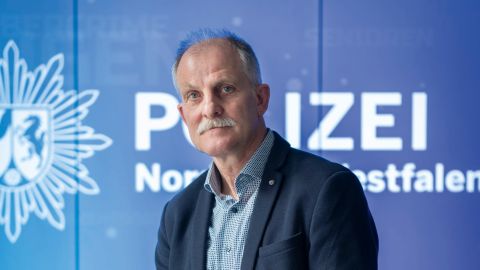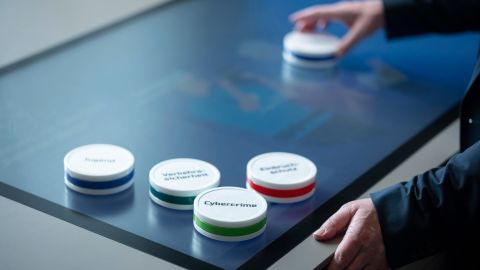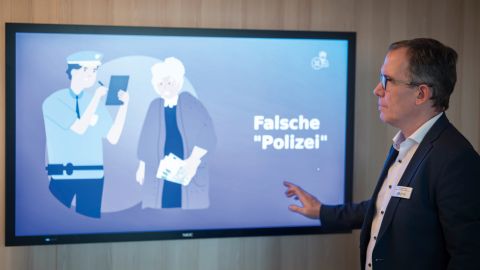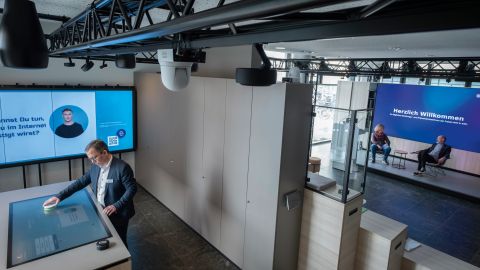The savings bank in Cologne-Porz. It's the last day in August, pension payment day. The weather forecast has reported rain. But when the bank counters open at 9.30 a.m., the sun is shining. Lucky for the senior citizens who have already been waiting outside. Lucky for the police officers from the Crime Prevention/Victim Protection Department, who are standing at white bar tables in front of the branch, handing out leaflets and providing information about con artists. The topic is more topical than ever. "Fake grandchildren" are constantly using new tricks to rob older people of their belongings - systematically and unscrupulously.
The Cologne police registered 1,200 crimes against older people last year alone: "Hello grandpa, I've had an accident. Please, please, I need money very quickly." "Hello grandma, someone will be by soon to collect it for me." And that's why the police have been called out today: to prevent the senior citizens who withdraw their money here from becoming victims in the first place. Pensioners with walking frames stop. One old lady says: "Someone has already called me. I picked up the phone." The officer praises her. The pensioner laughs and pockets a brochure: "You never know. Thank you, have a nice day." It goes on like this all morning.
Inform, admonish, warn. For many years, campaign days like the one in Cologne-Porz were the epitome of prevention: close to the citizens, their worries and problems, out on the street. But in times of digital change, the question arises: what can nice conversations and flyers do against an army of organized scammers who are constantly upgrading their technology and using computer bots to send millions of automated messages to millions of smartphones every day - and not just to senior citizens? The answer: far too little. That's why the police are responding consistently and are also taking up the digital fight against digital gangsters.
At the beginning of March, what is probably Europe's most modern digital advice and prevention center began its work at Cologne police headquarters. If the perpetrators are hunting down victims online with a scatter gun, then the police also want to stop them online. The state government has invested 1.7 million euros in the digital service point.
"If we successfully prevent crime, we don't need to fight it afterwards," said Interior Minister Herbert Reul at the opening. The aim of the state government is to reach as many people as possible so that the trap doesn't even snap shut when perpetrators mime desperate grandchildren on the phone, for example. When artificial intelligence makes their voices sound deceptively real and they even use software to stage role-playing games.
Crime on the internet is becoming increasingly common: Phishing, scamming, grooming, sextortion, ransomware attacks are all terms from the world of cybercrime. Very few people know what they are. Until they become victims. The police in North Rhine-Westphalia process more than one million reports every year. The number of unreported cases is estimated to be much higher. The damage is in the billions, not to mention the despair and shame of the victims. We want to put an end to the suspicion and cluelessness.
Walter-Pauli Ring 2, first floor left, directly behind a glass door in the foyer: six months after the flyer campaign in Cologne-Porz cybercrime, violence, senior citizens, youth, burglary protection, road safety.
Prevention expert Elke Döhler pushes a colored puck onto a circle in the middle of the desktop. It is surrounded by four flat borders, similar to a pool table. The round disk reads: Seniors. The display switches on, anime drawings and keywords pop up: "shock call", "grandchild trick", "fake policemen", "trick scam". Everything is shown on five large flatscreen monitors on the wall. There is more information under each menu item. Visitors can playfully learn all the tricks used by criminals. And above all: how to protect themselves from them. They can download information, films and photos to their cell phone using a QR code - there are even quiz games à la "Who wants to be a millionaire?": one question, four answers - only one is correct. You have to click on it.
"Come in and find out" - this is the idea behind the concept, which aims to do one thing above all: "Take prevention out of the shadows and make it fit for the future," says Chief Inspector Hans Hülsbeck, responsible for prevention and victim protection at the State Office of Criminal Investigation. In 2021, a team was put together to develop the idea for a kind of concept store with a showroom. "When people come in, it should go boom," he says. That's why there are lots of niches where citizens can go on a journey of discovery and try things out for themselves.
The team looked for a location that met the following conditions: First floor, lots of light, enough space and - if possible - footfall. In April 2023, the tradesmen arrived at Walter-PauliRing. This is exactly where the former State Director of Criminal Investigation Johannes Hermanns is now Chief of Police and landlord. For years, he has been calling for prevention to move with the times. That was fitting. "Advice is not limited to the new premises. We can connect directly to the people on the ground from here," says Hermanns.
The first online parents' evenings on the topic of "Dangers on the Internet" have already been held, with not just a few interested people from one class, but almost 2,000 mothers and fathers of schoolchildren from Cologne and Leverkusen taking part. The principle is to be applied to all areas in future, including the education of senior citizens. "Older people are often restricted in their mobility. We now have the opportunity to reach and advise them online in their homes or in their social environment," explains Detective Chief Inspector Thomas Jansen. He headed up homicide commissions for many years before joining Ralf Trippe's prevention team. Trippe himself came from state security and the fight against organized crime. Now both are preparing for a new task: life in front of the camera.
Technicians are still working in the room, where nothing is as it used to be: walls gone. Desks gone. Even the security locks and lockable window handles they need for burglary prevention advice are now in a cupboard, next to bicycle helmets and locks for road safety. "Touching is important. That's why we still get them out," says Trippe. But the actual consultations mainly take place on tablets, on which countless options can be displayed using 3D technology. The same applies to virtual reality glasses, which the road safety experts use. Students can slip into the role of truck drivers and experience for themselves what can happen when pedestrians or cyclists cross the road in a blind spot.
"The police need to be close to citizens, close to people. That's why we're moving with the times," says Ingo Wünsch, Director of the NRW State Office of Criminal Investigation. The aim is to get "in front of the situation", i.e. to act before you can only react. That's why visitors are confronted with a large ATTENTION flickering in the entrance area and the topic of the day: "The latest phishing emails - current fraud attempts in your email inbox." Then a link: "More about this here in the advice center." It's a hectic morning.
"We have to get used to the new technology," says Trippe, swiping one of five touch tablets installed on the walls and pillars. He can use them to control the technology anywhere in the room. A high-resolution LED screen in the TV studio displays tips against grandchild fraudsters. Touch: a movie is played. Trippe can also insert graphics or mugshots at the touch of a button - just like on talk shows or news programs. Four cameras hang from a steel frame. Touch: A lectern stands in glistening light. Touch: The lectern appears in the long shot. The focus is now on a small seating area on the stage. Interviews are to take place there.
"Who knows, maybe in the not-so-distant future there will even be a Kripo-TV online, hosted by detectives," says Detective Chief Inspector Hülsbeck from the LKA. There are enough topics. "How to make my house safe." Or: "How to protect myself from hate speech." Every year, together with the fire department: "Fire safety during Advent." A format like "Hart, aber fair" would be conceivable. A Kripo presenter interviews interviewees and plays films. Viewers can ask questions via a chat bot. "That would be my dream," says Hülsbeck.
IM NRW / Tim Wegner
Concept store with showroom





